Update: Don’t miss our newest “Most Anticipated” list, highlighting books for the rest of 2010 and beyond.
There’s something for every lover of fiction coming in 2010, but, oddly enough, the dominant theme may be posthumous publication. Roberto Bolaño’s relentless march into the canon has inured us to the idea of the bestseller from beyond the grave (and of course, for as long as there have been literary executors, this has been nothing new), but beyond the four(!) new books by Bolaño we also have have potentially important works by the likes of Ralph Ellison and Henry Roth, intriguing new books from Robert Walser and Ernst Weiss, a guaranteed bestseller from Stieg Larsson, and, looming in 2011, the final, unfinished novel of David Foster Wallace. Perhaps, amid all this, it is a relief to hear that we have many exciting books on their way from those still with us, including Elizabeth Kostova, Joshua Ferris, David Mitchell, Jennifer Egan, Don DeLillo, Ian McEwan, Yann Martel, and many others.
Special thanks to The Millions Facebook group for helping us compile this list.
January (or already available)
 Three Days Before the Shooting by Ralph Ellison: Fitting that this book preview starts off with a posthumous novel. Ellison’s unfinished opus will not be the the only posthumous work to grab readers attention in 2010, but it will be perhaps the one with the most history attached to it and maybe, in the accounting of those who manage the canon, the most important. Ellison famously struggled to complete a second novel after the landmark publication of The Invisible Man. After Ellison’s death, Juneteenth was cobbled together by his literary executor John Callahan and met with decidedly mixed reviews. But, as a 2007 article in the Washington Post argues, Three Days Before the Shooting, the result of years of work by Callahan and co-editor Adam Bradley, was always meant to be the true Ellison second novel. Readers will soon find out if it’s the masterpiece they’ve been waiting for for decades.
Three Days Before the Shooting by Ralph Ellison: Fitting that this book preview starts off with a posthumous novel. Ellison’s unfinished opus will not be the the only posthumous work to grab readers attention in 2010, but it will be perhaps the one with the most history attached to it and maybe, in the accounting of those who manage the canon, the most important. Ellison famously struggled to complete a second novel after the landmark publication of The Invisible Man. After Ellison’s death, Juneteenth was cobbled together by his literary executor John Callahan and met with decidedly mixed reviews. But, as a 2007 article in the Washington Post argues, Three Days Before the Shooting, the result of years of work by Callahan and co-editor Adam Bradley, was always meant to be the true Ellison second novel. Readers will soon find out if it’s the masterpiece they’ve been waiting for for decades.
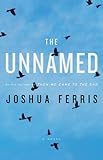 The Unnamed by Joshua Ferris: If your debut effort (in this case, Then We Came to the End) gets nominated for a National Book Award, you are on the express train to literary stardom. Quickly, however, focus shifts to the sophomore effort. For Ferris, early signs look good. Word is that The Unnamed is dark in tone, darker than and by all early accounts dissimilar to TWCTTE. The protagonist Tim’s affliction is that he’s unable to stop walking. In an early review, Bookforum likes it and says “Ferris possesses an overriding writer’s gift: a basic and consistent ability to entertain while spurring engagement.” See also: Joshua Ferris writing at The Millions
The Unnamed by Joshua Ferris: If your debut effort (in this case, Then We Came to the End) gets nominated for a National Book Award, you are on the express train to literary stardom. Quickly, however, focus shifts to the sophomore effort. For Ferris, early signs look good. Word is that The Unnamed is dark in tone, darker than and by all early accounts dissimilar to TWCTTE. The protagonist Tim’s affliction is that he’s unable to stop walking. In an early review, Bookforum likes it and says “Ferris possesses an overriding writer’s gift: a basic and consistent ability to entertain while spurring engagement.” See also: Joshua Ferris writing at The Millions


 Monsieur Pain by Roberto Bolaño: The frenzy of posthumous Bolaño publication will continue in 2010 with as many as four (that I was able to find) books by the Chilean author published. Bolaño has been unmistakably one of the biggest publishing stories of the last few years, and publisher New Directions has been capably and speedily adding title after title to the Bolaño shelf at your local bookstore. Monsieur Pain (January) is about a Peruvian poet with a chronic case of hiccups. Antwerp (April) has been described as both a prose poem and a crime novel. The Return (July) is a new volume of short stories, as is The Insufferable Gaucho (August?), which was apparently the last book Bolaño delivered to a publisher. And look for more Bolaño in 2011. Garth may need to start updating his Bolaño Syllabus on a quarterly basis.
Monsieur Pain by Roberto Bolaño: The frenzy of posthumous Bolaño publication will continue in 2010 with as many as four (that I was able to find) books by the Chilean author published. Bolaño has been unmistakably one of the biggest publishing stories of the last few years, and publisher New Directions has been capably and speedily adding title after title to the Bolaño shelf at your local bookstore. Monsieur Pain (January) is about a Peruvian poet with a chronic case of hiccups. Antwerp (April) has been described as both a prose poem and a crime novel. The Return (July) is a new volume of short stories, as is The Insufferable Gaucho (August?), which was apparently the last book Bolaño delivered to a publisher. And look for more Bolaño in 2011. Garth may need to start updating his Bolaño Syllabus on a quarterly basis.
Fun with Problems by Robert Stone: Fun with Problems will be Stone’s first collection of short fiction in twelve years. And his first book since his 2007 memoir Prime Green: Remembering the Sixties (see Garth’s review).
 Ordinary Thunderstorms by William Boyd: Boyd’s novel is already out in the UK where it has been receiving characteristically good notices. “There are tantalising hints of a broader ambition in William Boyd’s wide-ranging new thriller,” said The Guardian. The book is ostensibly about a man on the run, but Boyd, in an interview with Edinburgh Festivals alluded to the depth that The Guardian picked up on, “It’s a chase. And the drive is that the man is being hunted. But like the last four of my novels, it’s also about identity, about what happens when you lose everything that makes up your social identity, and how you then function in the modern city.”
Ordinary Thunderstorms by William Boyd: Boyd’s novel is already out in the UK where it has been receiving characteristically good notices. “There are tantalising hints of a broader ambition in William Boyd’s wide-ranging new thriller,” said The Guardian. The book is ostensibly about a man on the run, but Boyd, in an interview with Edinburgh Festivals alluded to the depth that The Guardian picked up on, “It’s a chase. And the drive is that the man is being hunted. But like the last four of my novels, it’s also about identity, about what happens when you lose everything that makes up your social identity, and how you then function in the modern city.”
 The Swan Thieves by Elizabeth Kostova – The follow-up to Kostova’s big selling The Historian (the first ever first novel to debut at #1 on the New York Times bestseller list) promises to be just as densely detailed as its predecessor, weighing in at a hefty 576 pages. Recently departed Kirkus has some quibbles with the plot machinations, but says “lush prose and abundant drama will render logic beside the point for most readers.” PW adds “The Swan Thieves succeeds both in its echoes of The Historian and as it maps new territory for this canny and successful writer.” See Also: Elizabeth Kostova’s Year in Reading
The Swan Thieves by Elizabeth Kostova – The follow-up to Kostova’s big selling The Historian (the first ever first novel to debut at #1 on the New York Times bestseller list) promises to be just as densely detailed as its predecessor, weighing in at a hefty 576 pages. Recently departed Kirkus has some quibbles with the plot machinations, but says “lush prose and abundant drama will render logic beside the point for most readers.” PW adds “The Swan Thieves succeeds both in its echoes of The Historian and as it maps new territory for this canny and successful writer.” See Also: Elizabeth Kostova’s Year in Reading
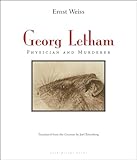 In January, Archipelago Books will publish a translation of Ernst Weiss’ Georg Letham: Physician and Murderer some 70 years after the novel’s appearance in German. Enthusiasts of German-language literature have compared Weiss favorably with his contemporary Thomas Mann and his friend Franz Kafka, but he has remained something of an unknown on this side of the Atlantic. Already, Joel Rotenberg’s translation has begun to remedy this neglect. An excerpt appeared in A Public Space a while back. (Garth)
In January, Archipelago Books will publish a translation of Ernst Weiss’ Georg Letham: Physician and Murderer some 70 years after the novel’s appearance in German. Enthusiasts of German-language literature have compared Weiss favorably with his contemporary Thomas Mann and his friend Franz Kafka, but he has remained something of an unknown on this side of the Atlantic. Already, Joel Rotenberg’s translation has begun to remedy this neglect. An excerpt appeared in A Public Space a while back. (Garth)
February
 Point Omega by Don DeLillo: Anticipation for DeLillo’s forthcoming book has been decidedly truncated. Publisher Scribner first tweeted about DeLillo delivering the manuscript in June, and the book will hit shelves a scant eight months later. One reason for the quick turnaround might be the book’s surprising slimness, coming in somewhere between 117 pages (says PW) and 128 pages (says Scribner). Imagine: reading an entire DeLillo novel in an afternoon, or perhaps just over lunch. So will the book’s slight profile belie some interior weightiness? A recently posted excerpt may offer some clues, and PW says “Reading it is akin to a brisk hike up a desert mountain—a trifle arid, perhaps, but with occasional views of breathtaking grandeur.”
Point Omega by Don DeLillo: Anticipation for DeLillo’s forthcoming book has been decidedly truncated. Publisher Scribner first tweeted about DeLillo delivering the manuscript in June, and the book will hit shelves a scant eight months later. One reason for the quick turnaround might be the book’s surprising slimness, coming in somewhere between 117 pages (says PW) and 128 pages (says Scribner). Imagine: reading an entire DeLillo novel in an afternoon, or perhaps just over lunch. So will the book’s slight profile belie some interior weightiness? A recently posted excerpt may offer some clues, and PW says “Reading it is akin to a brisk hike up a desert mountain—a trifle arid, perhaps, but with occasional views of breathtaking grandeur.”
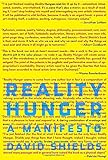 Reality Hunger: A Manifesto by David Shields: We’ve already discussed Shields’ forthcoming “manifesto” quite a lot at The Millions. It was first noted, in glowing terms, by Charles D’Ambrosio. This prompted me to dig deeper in a longer look at the book. From my sleuthing, and noting blurbs by J.M. Coetzee, Jonathan Lethem, and others, I posited “the intriguing possibility that a book of ideas will capture the popular interest [in 2010].” The book now sits on my desk, and while haven’t yet jumped in with both feet, I can report that it is both structurally (a lettered and numbered organization scheme whose logic is not immediately discernible) and stylistically (deep thoughts, reminiscences, aphorisms, and pop culture nuggets abound) unique. It will be interesting to see if readers decide the book coalesces into a successful whole. This just in – British publisher Hamish Hamilton reports that Zadie Smith will be writing up the book in The Guardian soon. See Also: David Shield’s Year in Reading
Reality Hunger: A Manifesto by David Shields: We’ve already discussed Shields’ forthcoming “manifesto” quite a lot at The Millions. It was first noted, in glowing terms, by Charles D’Ambrosio. This prompted me to dig deeper in a longer look at the book. From my sleuthing, and noting blurbs by J.M. Coetzee, Jonathan Lethem, and others, I posited “the intriguing possibility that a book of ideas will capture the popular interest [in 2010].” The book now sits on my desk, and while haven’t yet jumped in with both feet, I can report that it is both structurally (a lettered and numbered organization scheme whose logic is not immediately discernible) and stylistically (deep thoughts, reminiscences, aphorisms, and pop culture nuggets abound) unique. It will be interesting to see if readers decide the book coalesces into a successful whole. This just in – British publisher Hamish Hamilton reports that Zadie Smith will be writing up the book in The Guardian soon. See Also: David Shield’s Year in Reading
 The Infinities by John Banville: Banville follows up his Booker-winning effort The Sea with a novel with a rather unique conceit: it is narrated by the god Hermes. The reviews hint at further oddities. In The Guardian, for example, “Old Adam, a physicist-mathematician, has solved the infinity problem in a way that’s not only led to some useful inventions – cars that run on brine, for example – but also proved the existence of parallel universes, a category that includes the one he inhabits. In this novel, Sweden is a warlike country, and evolution and relativity have been discredited.”
The Infinities by John Banville: Banville follows up his Booker-winning effort The Sea with a novel with a rather unique conceit: it is narrated by the god Hermes. The reviews hint at further oddities. In The Guardian, for example, “Old Adam, a physicist-mathematician, has solved the infinity problem in a way that’s not only led to some useful inventions – cars that run on brine, for example – but also proved the existence of parallel universes, a category that includes the one he inhabits. In this novel, Sweden is a warlike country, and evolution and relativity have been discredited.”
 Union Atlantic by Adam Haslett: Haslett made a big splash in 2002 when his debut effort – a collection of short stories called You Are Not a Stranger Here – was a finalist for the National Book Award and the Pulitzer Prize. Union Atlantic, his first novel, takes the depths of the recent financial collapse as a backdrop (which explains why a work of literary fiction is getting notice from publications like American Banker). PW gave it a starred review and insinuates it might be a seminal novel of that particular historical moment. Esquire recently published the novel’s prologue. It begins, “Their second night in port at Bahrain someone on the admiral’s staff decided the crew of the Vincennes deserved at least a free pack of cigarettes each.”
Union Atlantic by Adam Haslett: Haslett made a big splash in 2002 when his debut effort – a collection of short stories called You Are Not a Stranger Here – was a finalist for the National Book Award and the Pulitzer Prize. Union Atlantic, his first novel, takes the depths of the recent financial collapse as a backdrop (which explains why a work of literary fiction is getting notice from publications like American Banker). PW gave it a starred review and insinuates it might be a seminal novel of that particular historical moment. Esquire recently published the novel’s prologue. It begins, “Their second night in port at Bahrain someone on the admiral’s staff decided the crew of the Vincennes deserved at least a free pack of cigarettes each.”
March
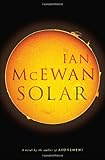 Solar by Ian McEwan: McEwan’s new novel was discussed extensively in Daniel Zalewski’s New Yorker profile of McEwan in February 2009. More recently, the magazine published an excerpt from the novel. The book’s protagonist is a Nobel Prize-winning physicist, and it appears that the book’s chief drama will arise in his becoming embroiled in the climate change “debate.” The book is also being called a satire, but, to the extent that several of McEwan’s books have elements of satire, it’s unclear whether Solar will be much of a departure for McEwan. The excerpt in the New Yorker would seem to indicate it’ll be a typical, and probably quite good, effort.
Solar by Ian McEwan: McEwan’s new novel was discussed extensively in Daniel Zalewski’s New Yorker profile of McEwan in February 2009. More recently, the magazine published an excerpt from the novel. The book’s protagonist is a Nobel Prize-winning physicist, and it appears that the book’s chief drama will arise in his becoming embroiled in the climate change “debate.” The book is also being called a satire, but, to the extent that several of McEwan’s books have elements of satire, it’s unclear whether Solar will be much of a departure for McEwan. The excerpt in the New Yorker would seem to indicate it’ll be a typical, and probably quite good, effort.
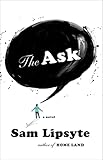 The Ask by Sam Lipsyte: Lipsyte had a breakout hit with Home Land in 2005. His follow-up novel was reviewed recently in The Quarterly Conversation, which says “let’s be frank: this is a hard novel to review. The Ask makes for your heart with its claws so efficiently that it leaves you torn and depleted. How are you to review a book that simply frightens you?” Ultimately, TQC decides The Ask “isn’t quite as good as Home Land. The latter was nearly perfect in idea and execution—an ’80s high-school movie gone sick with nostalgia for its own John Hughesian past. The Ask is more generationally diffuse. While just as snot-blowingly funny as its predecessor, The Ask is more devastating in its pitilessness.”
The Ask by Sam Lipsyte: Lipsyte had a breakout hit with Home Land in 2005. His follow-up novel was reviewed recently in The Quarterly Conversation, which says “let’s be frank: this is a hard novel to review. The Ask makes for your heart with its claws so efficiently that it leaves you torn and depleted. How are you to review a book that simply frightens you?” Ultimately, TQC decides The Ask “isn’t quite as good as Home Land. The latter was nearly perfect in idea and execution—an ’80s high-school movie gone sick with nostalgia for its own John Hughesian past. The Ask is more generationally diffuse. While just as snot-blowingly funny as its predecessor, The Ask is more devastating in its pitilessness.”
The Surrendered by Chang-Rae Lee: Bookdwarf read this one recently and says Lee “offers no easy endings or heartwarming coming-together, instead bringing to life a powerful, unpredictable, and occasionally painful story.”
Burning Bright by Ron Rash: Rash’s follow-up to Serena is a collection of stories. The book’s title story appeared in Ecotone in 2008.
One More Story: Thirteen Stories in the Time-Honored Mode by Ingo Schulze: Garth has been talking about Schulze here for at least two years. Most recently he wrote “The East German setting of New Lives, and its uroboric epistolary structure – starting late in the story, slowly filling in the background – made for slow going at first, but the ethical intensity of its restaging of Faust has haunted me since I read it.” The English (and somewhat illogical) title of Schulze’s new book would seem to obscure the unifying theme of the new collection, whose title, translated directly from the German original, is Cell Phone: Thirteen Stories in the Old Style. According to an abstract for a paper in the journal German Monitor, “the cell phone functions in many stories as a threatening symbol of exposure to pressures and problems that make East(ern) Germans feel ill at ease.”
So Much for That by Lionel Shriver: More hot button issues. Just as Ian McEwan’s forthcoming novel is informed by climate change, Shriver’s latest takes on the healthcare debate.
The Bradshaw Variations by Rachel Cusk: Cusk’s novel is already out in the U.K. where Hilary Mantel wrote, “It is the author’s mix of scorn and compassion that is so bracing. Sometimes she complicates simple things, snarling them in a cat’s cradle of abstraction, but just as often, a sentence rewards with its absolute and unexpected precision.”
 Silk Parachute by John McPhee: This new collection by McPhee is built around what FSG’s promotional material calls “McPhee’s most anthologized piece of writing.” “Silk Parachute” is, especially for the typically measured McPhee, a brief, tight, funny and emotional essay (It’s available here as a .doc file). The rest of the new collection is composed of McPhee’s recent New Yorker essays on lacrosse, “long-exposure view-camera photography, the weird foods he has sometimes been served in the course of his reportorial travels, a U.S. Open golf championship, and a season in Europe ‘on the chalk’ from the downs and sea cliffs of England to the Maas valley in the Netherlands and the champagne country of northern France.” Since McPhee’s most recent collections have had fairly strong thematic threads running through them, this more loosely tied book sounds like a bit of a departure.
Silk Parachute by John McPhee: This new collection by McPhee is built around what FSG’s promotional material calls “McPhee’s most anthologized piece of writing.” “Silk Parachute” is, especially for the typically measured McPhee, a brief, tight, funny and emotional essay (It’s available here as a .doc file). The rest of the new collection is composed of McPhee’s recent New Yorker essays on lacrosse, “long-exposure view-camera photography, the weird foods he has sometimes been served in the course of his reportorial travels, a U.S. Open golf championship, and a season in Europe ‘on the chalk’ from the downs and sea cliffs of England to the Maas valley in the Netherlands and the champagne country of northern France.” Since McPhee’s most recent collections have had fairly strong thematic threads running through them, this more loosely tied book sounds like a bit of a departure.
Long for This World by Sonya Chung: And, of course, Millions contributor Sonya Chung will see her debut novel Long for This World arrive in March. Sonya wrote about the peculiar challenges of settling on a book design in a recent essay.
April
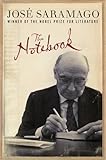 The Notebook by Jose Saramago: Nobel Laureates can do “blooks” too. The Notebook is the collected entries from 87-year-old Saramago’s blog, O Caderno de Saramago. The book, “which has already appeared in Portuguese and Spanish, lashes out against George W. Bush, Tony Blair, the Pope, Israel and Wall Street,” according to the Independent, in its report on the book’s Italian publisher dropping it for criticizing Prime Minister Silvio Burlusconi. Despite his age, Saramago is a busy man. In addition to The Notebook, there’s an August release date in the U.K. for a new novel, The Elephant’s Journey, which “traces the travels of Solomon, an Indian elephant given by King John III to Archduke Maximilian II of Austria,” and Cain, “an ironic retelling of the Bible story,” was recently published in Portuguese and Spanish.
The Notebook by Jose Saramago: Nobel Laureates can do “blooks” too. The Notebook is the collected entries from 87-year-old Saramago’s blog, O Caderno de Saramago. The book, “which has already appeared in Portuguese and Spanish, lashes out against George W. Bush, Tony Blair, the Pope, Israel and Wall Street,” according to the Independent, in its report on the book’s Italian publisher dropping it for criticizing Prime Minister Silvio Burlusconi. Despite his age, Saramago is a busy man. In addition to The Notebook, there’s an August release date in the U.K. for a new novel, The Elephant’s Journey, which “traces the travels of Solomon, an Indian elephant given by King John III to Archduke Maximilian II of Austria,” and Cain, “an ironic retelling of the Bible story,” was recently published in Portuguese and Spanish.
 Parrot and Olivier in America by Peter Carey: Carey’s new book is based on the life of Alexis de Tocqueville and wields two narrators. Olivier, the de Tocqueville “character” is, like de Tocqueville, the heir apparent of a wealthy family. Parrot is his clever servant who also happens to be a spy and all around rake. Early reviews from Australia, where the book is already out, have been strong. The Sydney Morning Herald called it “a tour de force, a wonderfully dizzying succession of adventures and vivid, at times caricatured, characters executed with great panache.”
Parrot and Olivier in America by Peter Carey: Carey’s new book is based on the life of Alexis de Tocqueville and wields two narrators. Olivier, the de Tocqueville “character” is, like de Tocqueville, the heir apparent of a wealthy family. Parrot is his clever servant who also happens to be a spy and all around rake. Early reviews from Australia, where the book is already out, have been strong. The Sydney Morning Herald called it “a tour de force, a wonderfully dizzying succession of adventures and vivid, at times caricatured, characters executed with great panache.”
The Dead Republic by Roddy Doyle: This book wraps up Doyle’s The Last Roundup trilogy (previously: A Star Called Henry and Oh, Play That Thing!). This time Henry Smart has gone to Hollywood and then back to Dublin. A bomb blast there turns him into an accidental hero.
What Becomes by A.L. Kennedy: This short story collection is already out in the U.K. The Spectator likes it: “The hardest thing about the advent of a new collection of stories by A.L. Kennedy… is the search for synonyms for ‘brilliant.'”
Beatrice and Virgil by Yann Martel: Though Martel’s previous effort, Life of Pi, was far from universally loved, the book became something of a literary phenomenon, putting up sales impressive even for a Booker winner. As a result, nearly a decade later, Martel’s follow up is one of the most heavily anticipated books of the year. As before, it seems Martel will be trading in talking animals, a taxidermied donkey and monkey. More details: The book is about the Holocaust, reportedly. It’s Canadian publisher has called it “shocking.” And Martel is comparing it to Animal Farm.
 The Big Short by Michael Lewis: Original set for November 2009, the publication of Michael Lewis’ much anticipated chronicle of the financial crisis, The Big Short has been pushed back to April. In October 2008, when economic uncertainty was at its height and fears were voiced in some rarefied quarters about the possibility of some sort of structural collapse, we wrote, “The world needs an exhaustive look at what happened in 2008 and why.” There have already been many books about the collapse and what caused it, from The Two Trillion Dollar Meltdown to The Return of Depression Economics and the Crisis of 2008, but many readers have been waiting for a book by Lewis, both because of his long history writing about Wall Street’s excesses and because of the powerful essay he penned on the topic for Portfolio magazine at the height of the crisis. Some readers may be weary of the topic by the time the book comes out, but it’s sure to garner some interest.
The Big Short by Michael Lewis: Original set for November 2009, the publication of Michael Lewis’ much anticipated chronicle of the financial crisis, The Big Short has been pushed back to April. In October 2008, when economic uncertainty was at its height and fears were voiced in some rarefied quarters about the possibility of some sort of structural collapse, we wrote, “The world needs an exhaustive look at what happened in 2008 and why.” There have already been many books about the collapse and what caused it, from The Two Trillion Dollar Meltdown to The Return of Depression Economics and the Crisis of 2008, but many readers have been waiting for a book by Lewis, both because of his long history writing about Wall Street’s excesses and because of the powerful essay he penned on the topic for Portfolio magazine at the height of the crisis. Some readers may be weary of the topic by the time the book comes out, but it’s sure to garner some interest.
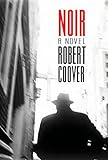 Noir by Robert Coover: An excerpt of this new novel by “pioneering postmodernist” Coover was published a while back in Vice. It is introduced thusly: “Noir is a short novel starring you as Philip M. Noir, Private Investigator. It began as a story about a dockside detective in pursuit of something—like truth or beauty, the ineffable—and became over the course of its writing a kind of companion piece to Ghost Town, which played with the western genre and mythology the way this one plays with the hard-boiled/noir genre and urban myth. It was the French who discovered and defined noir; consequently, this book will have its first publication in Paris, in French, in the spring of 2008.”
Noir by Robert Coover: An excerpt of this new novel by “pioneering postmodernist” Coover was published a while back in Vice. It is introduced thusly: “Noir is a short novel starring you as Philip M. Noir, Private Investigator. It began as a story about a dockside detective in pursuit of something—like truth or beauty, the ineffable—and became over the course of its writing a kind of companion piece to Ghost Town, which played with the western genre and mythology the way this one plays with the hard-boiled/noir genre and urban myth. It was the French who discovered and defined noir; consequently, this book will have its first publication in Paris, in French, in the spring of 2008.”
May
The Pregnant Widow by Martin Amis: This book, long in the works, has been evolving as Amis has struggled to write it. In 2006, he told The Independent it was, “blindingly autobiographical, but with an Islamic theme.” As it turns out, the autobiographical bits were causing Amis trouble. He told the National Post in August 2009, “it turned out it was actually two novels, and they couldn’t go together. So I wrote The Pregnant Widow, [that’s] one half of it, and the other half I started, and it will be very autobiographical, the next one.” Subsequent comments from Amis appear to indicate the two book solution is still the plan.
Imperial Bedrooms by Bret Easton Ellis: Imperial Bedrooms is reportedly a sequel to Ellis’ first novel Less Than Zero. First sentence of the novel? “They had made a movie about us.”
 The Invisible Bridge by Julie Orringer: Orringer received more than the typical notice for a debut short story collection when her 2003 How to Breathe Underwater was named a New York Times Notable Book, landed on various other lists, and picked up a small prize or two. It’s looking like that promising first effort may translate into a “big” novel for Orringer in 2010. Library Journal reported a 60,000-copy first printing for The Invisible Bridge – the book follows a trio of Hungarian brothers in Budapest and Paris before and during World War II – and it carries with it a blurb from Michael Chabon (“To bring an entire lost world… to vivid life between the covers of a novel is an accomplishment; to invest that world, and everyone who inhabits it, with a soul… takes something more like genius.”)
The Invisible Bridge by Julie Orringer: Orringer received more than the typical notice for a debut short story collection when her 2003 How to Breathe Underwater was named a New York Times Notable Book, landed on various other lists, and picked up a small prize or two. It’s looking like that promising first effort may translate into a “big” novel for Orringer in 2010. Library Journal reported a 60,000-copy first printing for The Invisible Bridge – the book follows a trio of Hungarian brothers in Budapest and Paris before and during World War II – and it carries with it a blurb from Michael Chabon (“To bring an entire lost world… to vivid life between the covers of a novel is an accomplishment; to invest that world, and everyone who inhabits it, with a soul… takes something more like genius.”)
 The Girl Who Kicked the Hornet’s Nest by Stieg Larsson: Larsson’s nordic crime fiction (which has won Larsson posthumous stardom in the States) isn’t exactly in The Millions wheelhouse, but, with nary a mention on the site, The Girl with the Dragon Tattoo vaulted into our Millions Top Ten and has stayed there. When Millions’ readers get behind a book, it’s often worth taking notice. The Girl Who Kicked the Hornet’s Nest is the final book in Larsson’s “Millennium Trilogy” (Dragon was the first and The Girl Who Played with Fire, the second). Though just becoming well known in the U.S., Larsson was the second top-selling author in the world in 2008. Part of Larsson’s sudden success is his odd path to (posthumous) publishing fame. Larsson was a journalist and activist who died of a heart attack. The manuscripts of his novels were found after his death. He had apparently written them just for fun. Five years later, the books are a publishing sensation.
The Girl Who Kicked the Hornet’s Nest by Stieg Larsson: Larsson’s nordic crime fiction (which has won Larsson posthumous stardom in the States) isn’t exactly in The Millions wheelhouse, but, with nary a mention on the site, The Girl with the Dragon Tattoo vaulted into our Millions Top Ten and has stayed there. When Millions’ readers get behind a book, it’s often worth taking notice. The Girl Who Kicked the Hornet’s Nest is the final book in Larsson’s “Millennium Trilogy” (Dragon was the first and The Girl Who Played with Fire, the second). Though just becoming well known in the U.S., Larsson was the second top-selling author in the world in 2008. Part of Larsson’s sudden success is his odd path to (posthumous) publishing fame. Larsson was a journalist and activist who died of a heart attack. The manuscripts of his novels were found after his death. He had apparently written them just for fun. Five years later, the books are a publishing sensation.
Private Life by Jane Smiley: There’s not much info on this one yet other than that it follows a Missouri woman’s life, from the 1880s to World War II.
The Good Man Jesus and the Scoundrel Christ by Philip Pullman: Pullman (famous for his His Dark Materials children’s series) will once again be courting controversy with this new book. According to The Guardian, “The book will provide a new account of the life of Jesus, challenging the gospels and arguing that the version in the New Testament was shaped by the apostle Paul.” In addition, the book will be released on Easter in the U.K. and is part of Canongate’s “Myths” series of books. Pullman also wrote an introduction to that series.
 The Microscripts by Robert Walser: The pothumous publication of Nabokov’s The Original of Laura, reproducing, front and back, the notecards on which Nabokov hat charted this unfinished work, was met with no small amount of scorn. This year, another posthumously published book, based off of notecard scrawlings, may be met more favorably. The story behind Walser’s Microscripts is fascinating. From the New Directions blog: “Walser wrote many of his manuscripts in a highly enigmatic, shrunken-down form. These narrow strips of paper… covered with tiny ant-like markings only a millimeter or two high, came to light only after the author’s death in 1956. At first considered a secret code, the microscripts were eventually discovered to be a radically miniaturized form of a German script: a whole story could fit on the back of a business card… Each microscript is reproduced in full color in its original form: the detached cover of a trashy crime novel, a disappointing letter, a receipt of payment.”
The Microscripts by Robert Walser: The pothumous publication of Nabokov’s The Original of Laura, reproducing, front and back, the notecards on which Nabokov hat charted this unfinished work, was met with no small amount of scorn. This year, another posthumously published book, based off of notecard scrawlings, may be met more favorably. The story behind Walser’s Microscripts is fascinating. From the New Directions blog: “Walser wrote many of his manuscripts in a highly enigmatic, shrunken-down form. These narrow strips of paper… covered with tiny ant-like markings only a millimeter or two high, came to light only after the author’s death in 1956. At first considered a secret code, the microscripts were eventually discovered to be a radically miniaturized form of a German script: a whole story could fit on the back of a business card… Each microscript is reproduced in full color in its original form: the detached cover of a trashy crime novel, a disappointing letter, a receipt of payment.”
June
The Thousand Autumns of Jacob de Zoet by David Mitchell: After Black Swan Green, a departure from the frenetic, layered Cloud Atlas which was broadly considered one of the best novels of the last decade, Mitchell fans may be pleased to hear that The Thousand Autumns of Jacob de Zoet is being described as a return to form. It’s long (512 pages) and set in Japan in 1799. The Guardian says, “Mitchell returns to the big canvas with this historical novel set in a Japanese outpost of the Dutch empire.”
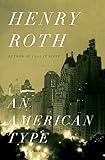 An American Type by Henry Roth: Here’s another interesting posthumous publication. Roth is revered for his 1934 novel Call It Sleep and his 1990s “comeback” effort, the Mercy of a Rude Stream cycle, and so news of this book, “discovered,” according to the publicity materials, “in a stack of nearly 2,000 unpublished pages by a young New Yorker editor,” will surely interest readers. A little more detail from the publicity materials: “Set in 1938, An American Type reintroduces us to Roth’s alter ego, Ira, who abandons his controlling lover, Edith, in favor of a blond, aristocratic pianist at Yaddo. The ensuing conflict between his Jewish ghetto roots and his high-flown, writerly aspirations forces Ira, temporarily, to abandon his family for the sun-soaked promise of the American West.”
An American Type by Henry Roth: Here’s another interesting posthumous publication. Roth is revered for his 1934 novel Call It Sleep and his 1990s “comeback” effort, the Mercy of a Rude Stream cycle, and so news of this book, “discovered,” according to the publicity materials, “in a stack of nearly 2,000 unpublished pages by a young New Yorker editor,” will surely interest readers. A little more detail from the publicity materials: “Set in 1938, An American Type reintroduces us to Roth’s alter ego, Ira, who abandons his controlling lover, Edith, in favor of a blond, aristocratic pianist at Yaddo. The ensuing conflict between his Jewish ghetto roots and his high-flown, writerly aspirations forces Ira, temporarily, to abandon his family for the sun-soaked promise of the American West.”
 A Visit from the Goon Squad by Jennifer Egan: This new novel by National Book Award nominee Egan sounds like it’s as ambitious and layered as Look At Me–and I’m sure it’ll be as addictively readable as The Keep. According to Amazon, it centers on the life of Bennie Salazar, “an aging former punk rocker and record executive, and Sasha, the passionate, troubled young woman he employs,” and the narrative traverses various eras and locales, “from the pre-Internet nineties to a postwar future.” Color me intrigued. (Edan)
A Visit from the Goon Squad by Jennifer Egan: This new novel by National Book Award nominee Egan sounds like it’s as ambitious and layered as Look At Me–and I’m sure it’ll be as addictively readable as The Keep. According to Amazon, it centers on the life of Bennie Salazar, “an aging former punk rocker and record executive, and Sasha, the passionate, troubled young woman he employs,” and the narrative traverses various eras and locales, “from the pre-Internet nineties to a postwar future.” Color me intrigued. (Edan)
July
Update: Super Sad True Love Story by Gary Shteyngart: A reader points out in the comments that Shteyngart has a new book coming out and since we absolutely would have included it had we known about it, here it is. A recent item at The Rumpus has the scoop: “His new novel is set slightly in the future. When he started writing it a few years ago, he envisioned a world where the world’s economy had collapsed and the central banks had to bail out the Big Three automakers. As that came to pass, he had to keep changing his novel, which got bleaker and bleaker. And now it’s set in ‘a completely illiterate New York,’ he said. ‘In other words, next Tuesday.'”
August
Sympathy for the Devil: This is a long way off so it’s hard to say how good it will be, but it sounds pretty cool: an anthology of stories about the devil from the likes of Neil Gaiman, Stephen King, Kelly Link, China Mieville, Michael Chabon, and others.
I Curse the River of Time by Per Petterson: Petterson has been on the road to international literary stardom for a few years now and that means his new novels get translated into English with relative alacrity. This means that English-speaking readers will get to see I Curse the River of Time, first published in Norwegian in 2008, later this year. The book won the Norwegian Brage prize and, according to a “sample translation” on Petterson’s agent’s website, it begins: “I did not realize that my mother had left. There was too much going on in my own life. We had not spoken for a month, or even longer, which I guess was not that unusual, in 1989, when you consider the things that went on around us back then, but it felt unusual.”
September
C by Tom McCarthy: At Ready Steady Book in September 2007, Mark Thwaite asked McCarthy: “What are you writing now?” And McCarthy responded: “Pathetically, my answer to this question is the same as it was when you last asked it over a year ago. I’m just under half way through a novel called C, which is about mourning, technology and matter. I’m writing it very slowly. It’s called C because it has crypts, cauls, call-signs, cocaine, cyanide and cysteine in it. And carbon: lots of carbon.”
Unknown
Nemesis by Philip Roth: News of this novel was announced nearly a year ago, but there is no release date thus far and not much is known about it beyond that it’s “a work of fiction set in the summer of 1944 that tells of a polio epidemic and its effects on a closely knit Newark community and its children.”
Freedom by Jonathan Franzen: Jonathan Franzen’s follow-up to The Corrections, Freedom, is likely to cause a stir when it appears, most likely in the fall. Among the prominent media narratives – the backlash, the backlash-to-the-backlash – will be the length of the novel’s gestation. Really, though, in novelist time (as distinct from internet time), nine years is a mere blip – particularly when you publish two books of nonfiction in the interim. Far more remarkable is how tight-lipped Franzen has managed to be about the novel’s content. From various obscure interviews, we’ve managed to cobble together the following: 1) The novel has something to do with U.S. politics, of the Washington, D.C. variety. 2) Franzen’s original conception of how those politics would intersect with the narrative changed radically in the writing, likely shifting from an “inside baseball” look at bureaucracy toward the personal. 3) Germany, where Franzen has spent some time recently, “will play an important role in the novel.” 4) After two New Yorker short stories notable for their smallness and misanthropy, the excerpt from the novel that appeared last year was notable for its return to the more generous ironies that endeared The Corrections to our “Best Fiction of the Millennium (So Far) panel.” (Garth)
The Pale King by David Foster Wallace: Wallace’s unfinished opus is sure to be a blockbuster when it appears – April 2011 is the latest word on a release date. The Howling Fantods, home to all things DFW, has been staying on top of the story. A recent report contained a number of tidbits, including this: “The subject of the novel is boredom. The opening of the book instructs the reader to go back and read the small type they skipped on the copyright page, which details the battle with publishers over their determination to call it fiction, when it’s all 100% true. The narrator, David Foster Wallace, is at some point confused with another David F. Wallace by IRS computers, pointing to the degree to which our lives are filled with irrelevant complexity.”
There are many other exciting books coming out in 2010 not mentioned here – let us know what books you are most looking forward to in 2010 in the comments section below.









